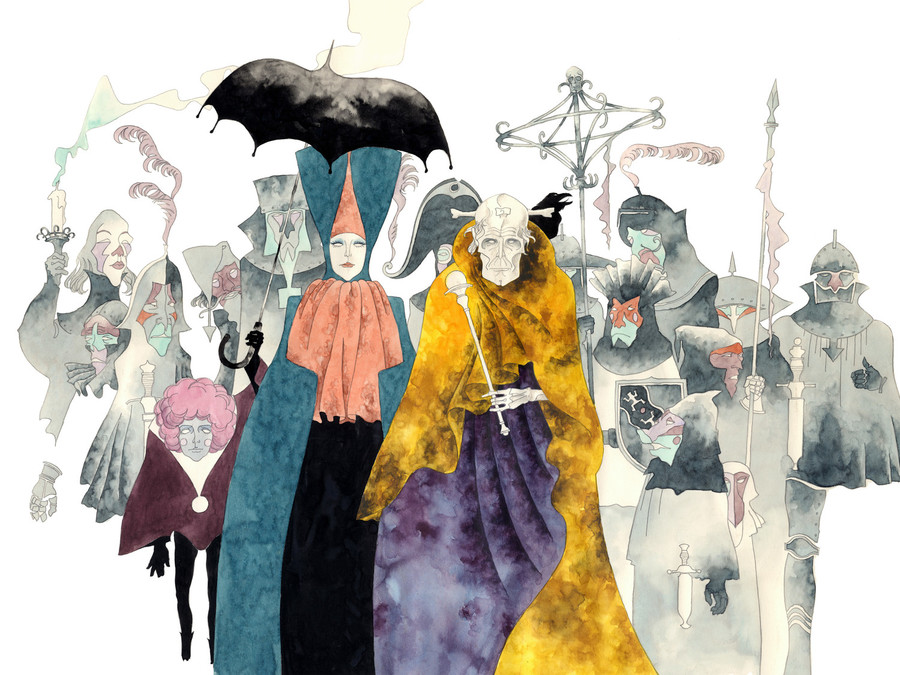Archive - 12th Five Flavours Film Festival
Belladonna of Sadness
Awards and festivals
Film description
Jeanne and Jean have just gotten married and settled in a rural village in medieval France. According to the law of the first night, local feudal ruler rapes Jeanne. After the incident her husband wishes to forget about it and move on with their lives, but she starts to see strange visions and a mysterious voice encourages her to take revenge on the rapist. Meanwhile the ruler wants to begin another war effort so he rises taxes during a famine in the village. Jean given difficult job of a tax collector, which he fails and ends up crippled. Jeanne takes a big loan and becomes a usurer herself, lending money with high interest she becomes more powerful and influential in the village. In middle ages when an ordinary woman gains too much power and independence, it does not envisage a happy ending.
"Belladonna of Sadness" is the last part of the Animerama trilogy, series of thematically-related adult anime feature films originally conceived and initiated by the father of Japanese manga, Osamu Tezuka, for whom Animerama was a dream project. Based on proto-feminist 1862 novel "Satanism and Witchcraft" by Jules Michelet, this experimental animation completed during the times of sexual revolution is nowadays an eccentric classic and an unique title in the history of Japanese cinema. "Belladonna of Sadness" visual style is inspired by art nouveau, it dazzles with colours and complicated compositions that constantly change shape. Director Eiichii Yamamoto uses extreme shots, quickly switching between close ups and long shots, which allows him to highlight the process of transformation on screen and the main character's inner world. "Belladonna of Sadness" turned out to be a commercial failure that lead to Mushi Production bankruptcy, however afterwards animation gained a small cult following.
The digital restoration in 4K technology was undertaken by three American companies: Cinelicious Pics, SpectreVision and the Cinefamily. The scanning and reconstruction process took place in Los Angeles in the Cinelicious Inc. headquarters - the post-production company launched by Paul Korver and Dennis Bartok, former American Cinematheque head programmer.
Maja Korbecka
Eiichi Yamamoto
Born in 1940 in Kyoto Prefecture. When Eiichi Yamamoto was a child his father served in the II World War, so his mother took him to live at her family house on the remote Shodoshima Island. He wanted to become an animator since he was a teenager, just after graduating from high school he started working at Ryuichi Yokoyama's animation Studio Otogi. Soon the studio completed its first TV series, "Astro Boy" created by legendary manga writer Osamu Tezuka. In 1961 Eiichii Yamamoto and Osamu Tezuka established Mushi Production where he animator worked as producer, supervising director or director until 1973 when he completed Mushi's last film, "Belladonna of Sadness". After the bankruptcy of the company he joined Toei and directed and supervised highly popular "Space Battleship Yamato". He retired from the animation industry in 1991.
1964 Tetsuwan Atomu / Astro Boy
1966 Janguru Taitei / Kimba the White Lion
1969 Senya Ichiya Monogatari / A Thousand and One Nights
1970 Kureopatora / Cleopatra
1973 Belladonna smutku / Kanashimi no Belladonna / Belladonna of Sadness
1977 Uchū Senkan Yamato / Space Battleship Yamato
1985 Odin - Koshi Hansen Starlight / Odin: Photon Sailer Starlight




